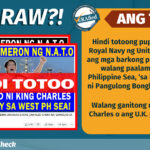“Ruthless. Barbaric. Inhuman.”
This was how Unyon ng mga Manggagawa sa Agrikultura (UMA) described the abduction, torture, and murder of Benito Tiamzon and Wilma Austria-Tiamzon, top-ranking leaders of the Communist Party of the Philippines (CPP), and the rest of the Catbalogan 10 in the hands of the Armed Forces of the Philippines (AFP).

n a statement released yesterday, the CPP revealed that the 10 were massacred on August 21 last year, and the atrocity was covered up with a fake firefight staged the next morning that supposedly culminated in an explosion when the victims were on a boat off the coast of Catbalogan—an elaborate white-wash.
“If the government put as much effort into solving peasant landlessness and widespread hunger as they did into this cover-up, then they could end this civil war easily,” declared UMA spokesperson John Milton ‘Ka Butch’ Lozande. “But they’d rather spend time and resources committing such disturbing war crimes instead.”
Ka Butch noted how the Marcos regime, akin to the US imperialist forces it serves, would describe revolutionaries like the Tiamzons as ‘terrorists’ in order to strip them of their rights. Such false rhetoric, however, did not exempt state forces and their actions from International Humanitarian Law (IHL) and the rules of war.
While IHL allowed for the capture of prisoners-of-war (POWs), it emphasized the need for humane treatment. Torture would constitute a grave violation, more so killing POWs who had been unarmed from the moment they were captured, then desecrating their bodies by exploding them on a boat just to fake a firefight.
“What these fascists fail to grasp is the more they peddle lies about revolutionaries, the more revolutionaries prove to the public what and who they really are—heroes,” explained acting UMA chairperson and Anakpawis Rep. Ariel ‘Ka Ayik’ Casilao. “And those who get in their way are villains in the way of justice and national liberation.”
Ka Ayik underscored how aligned the people’s war waged by the CPP through its armed wing, the New People’s Army (NPA), was with the demands of the toiling masses. Foremost on the revolution’s agenda was seizing control of land from imperialists, compradors, and the landlords they worked with, and handing it over to the peasantry.
With the democratic majority in control of land, resources drawn from it could be channeled away from the profit of foreign businesses and the demand of the international market, and towards domestic food security and national industrialization. This would improve social conditions not only in the countryside, but nationwide.
“Killing CPP leaders doesn’t make Marcos a strong leader. What it does is reveal how weak he is at addressing the problems that have made common Filipinos willing to take up arms,” concluded the former lawmaker. “The government can end this war with genuine social reforms if it wanted to. Question is, does it want to?”



